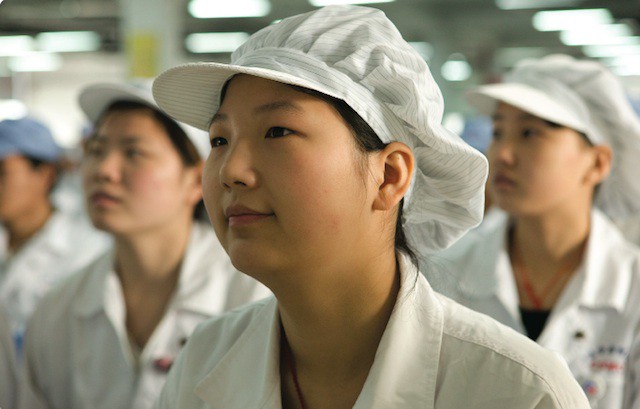The main point of performer Mike Daisey’s powerful one-man show about Apple and its Chinese factories is that in China, it’s cheaper to have people make products rather than have machines make those products. As a result, people are treated like machines. They perform the same tasks, day in, day out. They work excessively long hours and if they break down, they are discarded. Most tellingly, if they try to commit suicide, the factory puts up big nets around its buildings to catch them. Nothing about the work or the workplace is changed.
It’s these nets that Apple touts in its just-published Supplier Responsibility report, which details the progress it has made during 2011 in imposing standards on its overseas contractors. The report discusses child labor, factory poisonings and conflict materials. A whole section is devoted to the suicides in 2010 at Foxconn, its largest overseas supplier.
In the report, Apple says Chief Operating Officer Tim Cook (currently acting-CEO during Steve Jobs’ medical leave) toured Foxconn’s Shenzhen factory in June 2010 with two leading suicide experts. The group met with Foxconn Chief Executive Terry Gou.
Apple says it then commissioned an independent team of suicide experts to investigate the suicides at Foxconn. The team interviewed more than 1,000 workers, their managers, and investigated the factory and its dorms, Apple says.
The team found that Foxconn had basically fixed the problem with nets and counsellors:
The team commended Foxconn for taking quick action on several fronts simultaneously, including hiring a large number of psychological counselors, establishing a 24-hour care center, and even attaching large nets to the factory buildings to prevent impulsive suicides. The independent team also found that Foxconn had worked openly with many outside experts and government officials in reacting to the crisis. Most important, the investigation found that Foxconn’s response had definitely saved lives.
But what did the team recommend Foxconn do to prevent further suicides? Create better working hours and conditions? Invest in machines to perform mind-numbing assembly tasks, rather than people? Enforce humane work weeks? Set up trade unions?
No. The “independent” team of suicide experts, which Apple doesn’t name so that nosey reporters like me can’t follow up, said the suicide hotline counselrs should get more training. I’d laugh, if it wasn’t heartbreaking:
The independent team suggested several areas for improvement, such as better training of hotline staff and care center counselors and better monitoring to ensure effectiveness.
The report glosses over the crucial issue: that conditions in some of its overseas factories are inhumane and exploitative. Apple says in the report that is terminated business relationships with suppliers that employed children or took bribes. Good. That’s the right thing to do. But what about the conditions at Foxconn, it’s largest and obviously, most important supplier? Very little, it seems.
Now, I admit that Foxconn makes mountains of products for all the big electronics manufacturers, and I’ve never seen a supplier responsibility report from Dell, Hewlett-Packard, Sony, Panasonic or any of other companies whose products we buy.
But Apple is the lightning rod. It’s an iconic company with the profile and clout to make a difference. And it’s us — Apple’s customers — that need to hold the company’s feet to the fire.
A few years ago, Nike changed its sweatshop practices in response to consumer outcry. Apple should be held to the same standards.



32 responses to “Apple Touts Suicide Nets In Supplier Responsibility Report, But Changes Little”
Here here! I’ve been put off purchasing anything Apple by the recent news stories, even though I’m well aware Foxconn supply to hundreds of electronics firms. But Apple have the power to not only make a real difference to peoples lives, but to actually *save* lives. They aren’t doing anywhere near enough for me to come back on board as an Apple customer.
People keep killing themselves. Shall we make their lives better? No, we’ll just install nets….